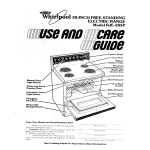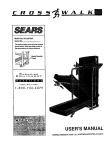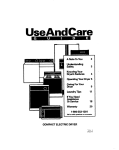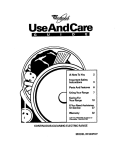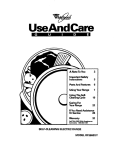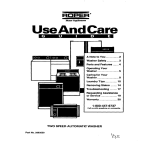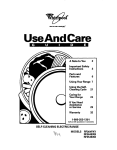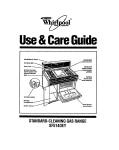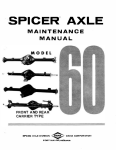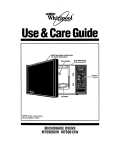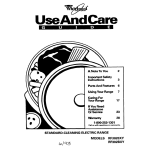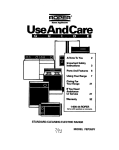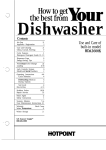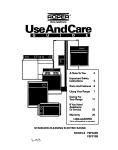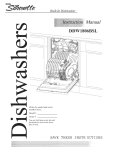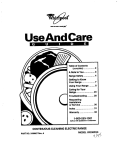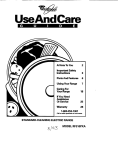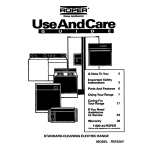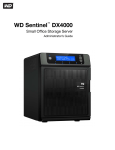Download Whirlpool RF3020XY User's Manual
Transcript
UseAndCam A Note To You 2 ImportantSafety Instructions 3 PartsAnd Features 6 Using Your Range 7 If You Need Assistance 23 Or Service Warranty Call TOLL-E c4mmerlw STANDARD-CLEANING With CIudons l-soo-z53-13[31 28 or ELECTRIC RANGE MODELS RF3020XY and RF302BXY A Note To You Thank you for buying a Whirlpool appliance. You have purchased a quality, worldclass home appliance. Years of engineering experience have gone into its manufacturfng. To ensure that you will enjoy many years of trouble-free operation, we have developed this Use and Care Guide. tt is full of valuable information on how to operate and maintain your appliance properly and safely. Please read it carefully. Also, please complete and mail the Ownership Registration Card provided with your appliance. Your safety is important to us. This guide contains safety symbols and statements. Please pay special attention to these symbols and follow any instructions given. Here is a brief explanation of the use of each symbol. This symbol will help alert you to such dangers as personal injury, burns, fire and electrical shock. This symbol will help you avoid actions which could cause product damage (scratches, dents, etc.) and damage to your personal property. Our Consumer is TOLL-FREE, number, Assistance Center 24 hours a day. l-800-253-1301, lf you ever have a question concerning your appliance’s operation, or if you need service, feel free to call our Consumer Assistance Center for help. When calling, you will need to know your appliance’s complete model number and serial number. You can find this information on the model and serial number plate (see diagram on page 6.) For your convenience, we have included a handy place below for you to record these numbers, the purchase date from the sales slip and your dealer’s name and telephone number. Keep this book and the sales slip together in a safe place for future reference. Model Number Dealer Name Serial Number Dealer Phone Purchase Date Important Safbty Instructions To reduce the risk of fire, electrical shock, injury to ersons, or damage when using the range, follow Easic precautions, including the following: General l l Read all instructions before using the range. Install or locate the range only in accordance with the provided Installation Instructions. It is recommended that the range be installed by a qualified installer. The range must be properly connected to electrical supply and grounded. fkz%M aWARNING: To reduce the risk of ti ping of the appliance, the app Piance must be secured by a proper, installed anti-tip bracket. f o check if the bracket is installed pro erly, see @The anti-tip bracke P” on page 16. @CAUTION: Do not store things children mi ht want above the range. Chil 8 ren could be burned or injured while climbing on it. .Do not leave children alone or unattended in area where the range is in use.They should never be allowed to sit or stand on an part of the range. They could 73e burned or injured. l Do not operate the range if it is damaged or not workrng properly. @Donot use the range for warming or heatin the room. Persons could be 9,urned or injured, or a fire could start. 4Jse the range only for its-in- . te;e;t,use as described In this . nits, ~DO not t areas near units, heating elements or interior surfaces of oven. Surface units and heating elements may be hot even though they are dark in color. Areas near surface units and interior surfaces of an oven become hot enou h to cause burns. During an c?after use, do not touch, or let clothing or other flammable materials contact surface units, areas near units, heatin elements or interior surfaces 07 oven until they have had sufficient time to cool. Other surfaces of the range ma become hot enough to cause I!urns; such as, the oven vent opening, the surface near the vent opening, the cooktop and the oven door. .Do not wear loose or hanging garments when using the range. They could ignite if they touch a hot surface unit and you could be burned. continued on next page 3 @Useonly d potholders. Moist or damp po7 holders on hot surfaces may result in burns from steam. Do not let potholder touch hot heating elements. Do not use a towel or bulk cloth for a potholder. It coul d catch on fire. ‘Keep range vents unobstructed. ‘Do not heat unopened containers. They could explode. The hot contents could cause burns and container particles could cause Injury. ‘Do not store flammable materials on or near the range. The fumes can create an explosion and/or fire hazard. When using l Check to be sure lass cooking utensils are sa3e for use on the ran e. Only certain types of glass, g9ass-ceramic, ceramic, earthenware or other glazed utensils are suitable for cooktops without breaking due to the sudden change in temperature. aNever leave surface units unattended at high heat settin s. A boilover could result an% cause smoking and greasy spillovers that may ignite. the cookto~ ‘Make sure the reflector bowls are in place during cooking. Cookin without reflector bowls may su%ject the wiring and components underneath them to damage. ‘Do not line reflector bowls with aluminum foil or other liners. Improper installation of these liners ma result in a risk of electric s r;ock or fire. ‘Select a pan with a flat bottom that is about the same size as the surface unit. If pan is smaller than the surface unit, some of the heating element will be exposed and may result in the I niting of clothing or potholders. 8 orrect pan size also improves cooking efficiency. @Turnpan handles inward, but not over other surface units. This will help reduce the chance of burns, i niting of flammable materia4s, and spills due to bumping of the pan. When usina the oven sition oven rack(s) in desired p”ocation while oven IS cool. If a rack must be removed while oven is hot, do not let potholder contact hot heating element in oven. 4Jse care when opening oven door. Let hot air or steam escape before removing or replacing food. l Always Grease Care aryi cleaning @Grease is flammable. Do not allow grease to collect around cooktop or in vents. Wipe spillovers immediately. ADOnot soak removable heating elements in water. The element will be damaged and shock or fire could result. @Donot clean door heat seal. It is essential for a good seal. Care should be taken not to rub, damage or move the seal. Clean only parts recommended in this Use and Care Guide. *Do not repair or replace any part of the range unless specifically recommended in this manual. All other servicing should be referred to a qualified technician. @Disconnect the electrical supply before servicing the range. .Do not use water on grease fires. Never pick up a flaming pan. Smother flamin pan on range b coverin WI7h a wellfitted IiJ , cookie s7l eet or flat tray. Flaming grease outside of an can be extin uished with 1aking soda or, iBavailable, a multipurpose dry chemical or foam-type extinguisher. - SAVE THESE INSTRUCTIONS - PartsAnd Features This section contains captioned illustrations of your range. Use them to become familiar with the location and appearance of all parts and features. Antctlp braokat (on wall behlnd cmtrol panel) Plug-In unlt - Broil element Bake elemmt Control Left front COlltrol panel Ml mar control oven temDsmtllm Burfaoe I light heating lndkator 6 &en heating lndkator light Burfiloe unlt dector Right rear control knob Right f&t control knob Using Your Range In This Section Uslng the surface Posltlonlng units ..................................... Page T7 racks and pans ............................... For best air drculation ..................................... 9 10 Brolllng tips ....................................................... Energy saving tlps ..... ..” ................................... The oven vent ........................................... Page 13 14 ..I .... 15 Uslng aluminum foil for baking ..................... . 10 The storage drawer ........ . .................... -. ......... 15 Baklnglroastlng ..................... . ................... .-. The antl-tlp bracket .. ..“..““...“.“......” Adjusting Brolllng the oven temperature 11 control ....... .12 .................... ..-...........................“..” .... 12 Optlonal .............. 16 door panel pat .. . .............................. 16 To obtain the best cooking results possible, you must operate your range properly. This section gives you important information for efficient and safe use of your range. Using Control turning knobs the surface must be pushed units In before them to a setting. They can be set anywhere between HI and OFF. Surface unit markers The solid dot in the surface unit marker shows which surface unit is turned on by that knob. Surface heating indicator light The SURFACE HEATING Indicator Light on the control panel will glow when a surface unit is turned on. Burn and Fire Hazard Be sure all control knobs are turned to OFF and all indicator lights are OFF when you are not cooking. Someone could be burned or a fire could start if a surface unit is accidentally left ON. Until you get used to the settings, use the following as a gulde. For best results, start l cooking at the high settings; then turn the control knob down to continue cooking. 1 SEITING HI 1 l l Medium-high l l Medium l l Medium-low LO Cookware l l RECOMMENDED USE To start foods cooking. To bring liquids to a boil. To hold a rapid boil. To fry chicken or pancakes. For gravy, pudding and icing. To cook large amounts of vegetables. To keep food cooking after starting it on a higher setting. To keep food warm until ready to serve. tips There is no one brand of cooking utensil that is best for all people. Knowing something about pan materials and construction will help you select the right cooking utensils for your needs. l Use only flat-bottomed utensils that make good contact with the surface units. To check the flatness of a utensil: - Turn it over and check the bottom of the pan by placing a ruler across it. - Rotate the ruler in all directbns. There should be no gaps between the pan and the ruler. NOTE: Woks, canners and teakettles with flat bottoms suitable for use on your cooktop are now available in most houseware stores or departments. -0 The pan should have straight sides and a tightfiiing lid. l Choose medium to heavy gauge (thickness) pans that are fairly lightweight. Remember that a very heavy pan will be even heavier when filled with food. l The pan material (metal or glass) affects how fast heat transfers from the surface unit through the pan material and how evenly heat spreads over the pan bottom. l Handles shoukf be made of a sturdy, heatresistant material and be securely attached to the pan. l I Do not leave an empty utensil, or one which has boiled dry, on a hot surface unit. It can overheat and may damage the utensil or surface unit. Do not use canners, woks and specialty utensils with rounded, war@, ridged or dented bottoms. These could cause severe overheating which damages the utensil and/or surface unit. Product Damage Hazard ff a surface unit stays red for a long time, the bottom of the pan is not flat enough or is too small for the surface unit. Prolonged usage of incorrect utensils for long periods of time can resuft in damage to the surface unit, cooktop, wiring and surrounding areas. To prevent damage, use correct utensils, start cooking on HI and turn control down to continue cooking. Home canning information To protect your range: l Use flat-bottomed canners for best results. Do not use canners with dented or ridged (porcelain enamel-ware) bottoms. They do not make good contact with the surface unit and cause severe overheating which damages the cooktop. l For best results, use the largest surface unit. Also, use a canner which can be centered over the surface unit. Large diameter canners, if not properly centered, trap heat and can cause damage to the cooktop. l Do not place canner on two surface units at the same time. Excessive heat build-up will damage the cooktop. l Start with hot water. This reduces the time the control is set on high. Reduce heat setting to lowest position needed to keep water boiling. l Keep reflector bowls clean for best heat reflection. l To prolong the life of the elements: - Prepare small batches at a time. - Do not use elements for canning all day. Positioning racks and pans For baking/roasting with one rack, the rack should be placed so the top of the food will be centered in the oven. Always leave at least 1’/2 to 2 inches (4-5 cm) between the sides of the pan and the oven walls and other pans. For proper cooklng, follow these guldellnes for speclflc foods: l Angel and bundt cakes, yeast breads, frozen pies, large roasts and turkeys-place rack on lowest level. l Casseroles, muffins, most quick breads and meats-place rack on second or third level from bottom. l Cookies, biscuits, cakes and non-frozen piesplace rack on second or third level from bottom. When baking on two racks, arrange racks on bottom and third level from bottom. NOTE: For recommended rack placement broiling, see a reliable cookbook. Optional canning kit The large diameter of most water-bath or pressure canners combined with high heat settings for long periods of time can shorten the life of regular surface units and cause damage to the cooktop. tf you plan to use the cooktop for canning, we recommend the installation of a Canning Kit. Order the kit (Part No. 242905) from your Whirlpool dealer or authorized WhirlpooP”’ service company. when Personal Injury Hazard Always position oven rack(s) in desired location before turning oven on. Be sure the rack(s) is level. l tf rack(s) must be moved while oven is hot, use potholders or oven mitts to protect hands. Failure to follow the above precautions may result in personal injury. l For best air circulation Hot air must circulate around the pans in the oven for even heat to reach all parts of the oven. l Place the pans so that one is not directly over the other. l Allow 1X-2 inches (4-5 cm) of space around each pan and between pans and oven walls. l Use only one cookie sheet in the oven at one time. Use the following as a guide to determine where to place the pans. One pan Place in the center of the oven rack. 4 Two pans Place in opposite corners of the oven rack. Three or four pans Place in opposite corners on each oven rack. Stagger pans so no pan is directly over another. NOTE: “Oven peeking” may cause heat Loss, longer cooking times and unsatisfactory baking or roasting results. Use a reliable kitchen timer to keep track of the cooking time. Using aluminum foil for baking Use aluminum foil to catch spillovers from pies or casseroles. l Place the foil on the oven rack below the rack with the food. The foil should have the edges turned up and be about 1 inch (3 cm) larger all around than the dish holding the food. l Do not cover the entire rack with aluminum foil. tt will reduce air circulation and cause poor cooking results. l Do not line oven bottom or entire oven rack with foil or other liners. Poor baking will result. Electrical Shock and Fire Hazard Do not allow foil to touch the heating elements because it will damage them and could result in shock or fire hazard. 10 Baking/roasting 1. Position the rack(s) properly before turning on the oven. To change rack posltlon, lift rack at front and pull out. For information on positioning racks, see “Positioning racks and pans’ on page 9. 2. Set the Oven Selector to BAKE. 3. Set the Oven Temperature Control Knob to the baking/roasting temperature you want. The OVEN HEATING Indicator Liiht will come on. The oven is preheated when the OVEN HEATING Indicator Lght first goes off. NOTE: Do not preheat oven when roasting or ccddrg items such as casseroles. 4. Put food in the oven. During baking/roasting, the elements will turn on and off to maintain the temperature setting. The OVEN HEATING Indicator Light will turn on and off with the elements. NOTE: The top element helps heat durlng baklnglroastlng, but does not turn red. 5. When baking/roasting is done, turn both the Oven Selector and the Oven Temperature Control Knob to OFF. The OVEN HEATING Indicator Light will go off. 11 Adjusting the oven temperature Does your oven seem hotter or colder than your old oven? The temperature of your old oven may have shifted gradually without you noticing the change. Your new oven is properly adjusted to provide accurate temperatures. But, when compared to your old oven, the new design may give you different results. If. after using the oven for a perbd of time, you are not satisfii with the temperature settings, they can be adjusted by folbwing these steps: 1. Turn the Oven Temperature Control Knob to ;hzv&J position. Pull knob straight off and flip . 2. Loosen the locking screws inside the control knob. Note the positkn of the notches. 3. To lower the temperature, hold knob handle firmly and move the tooth a notch counterclockwise. Each notch equals about 5°F (2.5%). 4. To rake the temperature, hold knob handle firmly and move the tooth a notch clockwise. Each notch equals about 5OF (2.5%). ~~~~~bocklng screws and replace the Broiling 1. Position the rack properly before turning on the oven. The oven rack should be positioned so that the surface of the food is at least 3 inches (7.4 cm) away from the broil element. See ‘Positioning racks and pans’ on page 9. 2. Put the broiler pan and food on the rack. 3. Cbse the door to the Broil Stop position (open about 4 inches [ 10.2 cm]). The door will stay open by itself. 4. Set the Oven Selector and Oven Temperature Control Knob to BROIL The OVEN HEATING Indicator Lght will come on. NOTE: Do not preheat oven when broiling. 5. When broiling is done, turn both the Oven Selector and Oven Temperature Control Knob to OFF. The OVEN HEATING Indicator Light will go off. 12 control Custom broil tf food is cooking too fast, turn the Oven Temperature Control Knob counterdockwlse until the OVEN HEATING Indicator Light goes off. l If you want the food to broil slower from the start, set the Oven Temperature Control Knob between 170°F and 325°F (77% and 162.7%). These temperature settings albw the broil heating element to cycle and to slow cooking. The bwer the temperature, the slower the cooking. l Fiih and chicken are some foods that may cook better if you use lower broiling temperatures. The Oven Selector must be on BROIL for all broiilng temperatures. l NOTE: The oven door must be partly open whenever the oven is being used to broil. Leaving the door open allows the oven to maintain proper temperatures. Broiling tips Use the broiler pan and grid for broiling. They are designed to drain excess liquid and fat away from the cocking surface to help prevent spatter. smoke or fire. l Refer to a broiling chart in a reliable cookbook for correct broiling times. . After broiling, remove the broiler pan from the oven when you remove the food. Drippings will bake on the pan if if is left in the heated oven. l Fire Hazard l l Place meat the correct distance from the element. Meat placed too close to the element may spatter, smoke, burn or catch fire during broiling. To ensure adequate grease drainage, do not use cookie sheets or similar pans for broiling. Also, covering the broiler grid with foil is not recommended. Poor drainage of grease may result in fire. ff foil is used, cut slits in foil to correspond with all openings in broiler grid. Grease can then drain away and cool in pan. 13 Energy saving tips Although the energy used for cooking is usualty a very small percentage of the total energy used in the home, cooking energy can be used effiiently. Here are some tips to help you conserve energy when using your cooking product. l Use pans with flat bottoms, straight sides and tight-fitting lids. . Match the pan to the surface unit size. l Cook with a minimum of liquid or fat to help shorten cixking time. l Preheat pans only when recommended and for the shortest time possible. l Start food on higher heat settings, then set surface unit control on bw or off to finish cooking. Use retained heat for axking when possible. l Use the more efficient surface units instead of the oven when possible. 14 l l l l l l l Turn on me surface unit only after placing filled pan on the unit. Qven peeking’ may cause heat bss, longer codcing times and unsatisfactory baking results. Rely on your timer. Bake cakes, pies or cookies when oven is warm. Best time is after a meal has been cooked in it. Preheat the oven no bnger than necessary. Plan your meals for the most efficient use of the range. When using the oven to cook one food, try to cook the rest of the meal in it also. Do not preheat when broiling, roasting or cooking items such as casseroles. Keep reflector bowls clean for best heat reflection. The oven vent Hot air and moisture escape from the oven through a vent under the right rear surface unit. You can cook on the unii or keep food warm on it while the oven is on. The vent is needed for air circulation. Do not block the vent. Poor baking/ roasting can result. NOTE: Plastic utensils left over the vent can melt. Burn and Fire Hazard lf you leave a utensil on the right rear surface unit, use potholders when moving it. Pan handles can become hot enough to burn. Keep flammable materials away from oven vent. Failure to do so can result in burns or a fire. The storage drawer The storage drawer is for storing pots and pans. The drawer can be removed to make it easier to clean under the range. Use care when handling the drawer. Removlng the storage drawer: 1. Empty drawer of any pots and pans before removing drawer. Pull drawer straight out to the first stop. Lift front and pull out to the seamd stop. 2. Lift back slightly and slide drawer all the way out. Replaclng the storage drawer: 1. Fit ends of drawer slide rails into the drawer guides on both sides of opening. 2. Lift drawer front and push in until metal stops on drawer slide rails clear white stops on drawer guides. Lift drawer front again to clear second stop and slide drawer closed. Drawe; slide rail w 15 The anti-tip bracket The range will not tip during normal use. However, tipping can occur if excessive force or weight is applied to the open door without the anti-tip bracket properly secured. To verlfy the antl-tlp bracket Is engaged: l Look to see if the anti-tip bracket is attached with screws to the wall behind the control panel. l Make sure the cable tether on the back of the range is secured by the two hooks on the bracket. l See Installation Instructions for further details. Optional door panel pat (model lf you would like to change the color of your oven door glass to white or almond, you can order one of these kits: l White (Kii No. 814071) l Almond (Kit No. 814672) from your Whirlpool Dealer. The kits include easy installation instructions. 16 RF302BXY) Caring For Your Range In This Surface Section unlls and reflector UH-up cooktop Page bowls . . . . . . . . . . .._..... 17 . . . . . . . . . . . . . . . . . . . . . . . . . . . . . . . . . . . . . . . . . . . . . . . .. 20 Removlng Cleanlng Your range is designed for ease of care. Most cleaning can be done with items found around your home. Cleaning your range whenever spills or soiling occurs will help to keep if looking and operating like new. Surface units and reflector Page the oven door . . . . . . . . . . . . . . . . . . . . . . I . . . . . . . . . 20 chart . . . . . . . . . . . . . . . . . . . . . . . . . . . . . . . . . . . . . . . . . . . . . . . . . . . 21 Burn and Eiectrical Shock Hazard Make sure ail controls are OFF and the range is cool before cleaning. Failure to do so can result in burns or electrical shock. bowls Removing 1. Make sure all surface units are off and cool before removing surface units and reflector bowls. 2. Lift the edge of the unit, opposite the receptacle, just enough to clear the element hokfdown clip and the reflector bowl. 17 3. Pull the surface unit straight away from the receptacle. 4. Lift out the reflector bowl. See “Cleaning chart’ on page 21 for cleaning instructions. Replacing 1. Make sure all surface units are off and cool before replacing surfa- units and reflector bOWIS. 2. Line up openings in the reflector bowl with the surface unit receptacle and the element holddown clip. 18 3. Hold the surface unit as level as possible with the terminal just started into the receptacle. Push the surface unit terminal into the receptacle. 4. When terminal is pushed into the receptacle as far as it will go, push down the edge of the surface unit opposite the receptacle. The element holddown clip will keep the surface unit from moving around. NOTE: Reflector bowls reflect heat back to the utensils on the surface units. They also help catch spills. When they are kept clean, they reflect heat better and look new longer. lf a reflector bowl gets discolored, some of the utensils may not be flat enough, or some may be too large for the surface unit. In either case, some of the heat that’s meant to go into or around a utensil goes down and heats the reflector bowl. This extra heat can discolor it. 19 Lift-up 1. cooktop Lift front of cookto~ at both front corners until the support rods lock into place. Personal l l Injury;nd rdroduct Damage a 2f Be sure both support rods are fully extended and in the locked position. Failure to do so could result in personal injury from the cooktop accidentally falling. Do not drop the cooktop. Damage can resuk to the porcelain and the cooktop frame. 2. Wipe with warm, soapy water. Use a soapy steel-wool pad on heavily soiled areas. 3. To lower the cooktop, lift cooktop from both sides while pressing the support rods back to unlock them. Lower the cook-top into place. Removing the oven door Removing the oven door will help make it easier to clean the oven. Burn and Electrical Shock Hazard Make sure all controls are OFF and the oven is cool before removing oven door Failure to do so can result in burns or 1 electrical shock. . 1. Open the door to the first stop position. 2. Hold the door at both sides and lift it at the same angle it Is In. 3. To replace, fit the bottom corners of the door over the ends of the hinges. Push the door down evenly. The door will close only when it is on the hinges correctly. 20 Cleaning chart Use the following table to help you dean all parts of your range. PART WHAT TO USE HOW TO CLEAN Control knobs Sponge and warm, soapy water Turn knobs to OFF and pull straight away from control panel. l Wash, rinse and dry thoroughly. Do not soak. l Replace knobs. Make sure all knobs point to OFF. DO NOT USE steel wool or abrasive cleaners. They may damage the finish of the knobs. Control panel Sponge and warm, soapy water OR Paper towel and spray glass cleaner l Wash, rinse and dry thoroughly. DO NOT USE steel wool or abrasive cleaners. They may damage the finish. Sponge and warm, soapy water l Wash, rinse and dry thoroughly. USE nonabrasive, plastic scrubbing pad on heavily soiled areas. l Do not use abrasive or harsh cleansers. NOTE: Do not allow foods containing acids (such as vinegar, tomato or lemon juice) to remain on surface. Aciis may remove the glossy finish. Also wipe up milk or egg spills when cooktop is cool. Exterior surfaces (other than control panel) Surface untts Chrome reflector bOWIS Brolkr pan and grld (clean after each use) No cleaning required Warm, soapy water and a nonabrasive, plastic scrubbing pad Steel-wool pad and warm, soapy water Oven racks Steel-wool pad and warm, soapy water Oven door glass Paper towel and spray glass cleaner OR Warm, soapy water and a nonabrasive, plastic scrubbing pad l l Spatters or spills will bum off. l Do not Immerse ln water. l Wash, rinse and dry thoroughly. Clean frequently. Do not use abrasive or harsh cleansers. l Wash, rinse and dry thoroughly. l Wash, rinse and dry thoroughly. l l l l l Make sure oven is cool. Folbw directions provided with the cleaner. Wash, rinse and dry thoroughly. continued on next page 21 PART Oven cavity HOW TO CLEAN WHAT TO USE Steel-wool pad and warm, soapy water OR Commercial l l l oven cleaners l l l l l l Heavy-duty aluminum foil or shallow pan l Make sure oven is cool. Remove dcor for easier access. Clean heavity soiled areas or stains. Rinse well with water. Remove door for easier access. Place newspaper on fbor to proted fbor surface. Follow directions provided with the oven cleaner. Rinse well with clear water. Use in well-ventilated room. Do not allow commercial oven cleaners to, contact the heatlng elements, heat seal, thermostat or l xterbr surfaces of the range. Damage will occur. Place piece of foil or shallow pan, slightly larger than the cooking container. on lower rack to catch spillovers. NOTE: Do not use foil or foil liner to cover the oven floor. Poor baking/roasting results could occur. 22 If You Need Assistance setvice Or This section is designed to help you save the cost of a service call. First we outline possible problems, their causes and their solutions. However, you may still need assistance or service. When calling our Consumer Assistance Center for help or calling for service, you will need to provide a complete description of the problem, your appliance’s complete model and serial numbers and the purchase date. (See page 2.) This information is needed to respond to your request properly. 1. Before calling for assistance ... Performance problems often result from little things you can find and fix without took of any kind. Please check the chart below for problems you can fix. It-could save you the cost of a service call.’ PROBLEM Nothlng will operate The oven will not operate The surface unlts will not operate Control knob(s) will not turn POSSlBLE CAUSE SOLUTlON The power cord is not plugged into a live circuit with proper voltage. Plug the power cord into a live circuit with proper voltage. (See Installation Instructions.) A household fuse has blown or a circuit breaker has tripped. Replace househokl fuse or reset circuit breaker. The Oven Selector is not turned to BAKE or BROIL Turn the Oven Selector to BAKE or BROIL. The Oven Temperature Control Knob is not turned to a temperature setting. Turn the Oven Temperature Control Knob to a temperature setting. A household fuse has bbwn or a circuit breaker has tripped. Replace household fuse or reset circuit breaker. Surface units are not plugged in all the way. Plug surface units in all the way. (See ‘Replacing’ on page 18.) The control knobs are not being set correctly. Push control knobs in before turning to a setting. You are not pushing in before turning. Push control knob(s) in before turning to a setting. continued on next page 23 PROBLEM POSSIBLE Cooking results are not what you expected The range is not level. CAUSE The oven temperature too low or too high. seems The oven was not preheated as the recipe calls for. The recipe has never been tested or is not from a reliable source. The pans are not the type or size recommended in the recipe. There is not proper air circulation around pan when baking. The cooking utensils are not the proper shape or do not fit the surface units being used. 24 . SOLUTlON Level range. (See Installation Instructions.) Adjust the oven temperature control (See “Adjusting the oven temperature control” on page 12.) Preheat oven if called for in recipe. Use only tested recipes from a reliable source. Refer to a reliable cookbook for recommended pan type and size. Allow 1% to 2 inches (4-5 cm) on all sides of the pans for air circulation. Use cooking utensils with smooth, flat bottoms that fit the surface units being used. 2. If you need assistance ... Call Whlrlpool Consumer Asslstancs Center telephone number. Dial free from anywhere In the U.S.: l-800-253-1 301 and talk with one of our trained consultants. The consultant can instruct you in how to obtain satisfactory operation from your appliance or, if service is necessary, recommend a qualified service company in your area. lf you prefer, write to: Mr. William Clark Consumer Assistance Representative Whirlpool Corporation 2000 M-63 Benton Harbor, Ml 49022 Please include a daytime phone number in your correspondence. 3. If you need service - .APPLlANCE-HOUSEHOLD MAJOR, SERVlCE 6 REPAIR . WASHNG DRYERS. FSP is a registered trademark of Whirlpool Corporation for quality parts. Look for this symbol of quality whenever you need a replacement pan for your Whirlpool appliance. FSP replacement parts will fit right and work right, because they are made to the same exacting specifications used to build every new Whirlpool appliance. To locate FSP replacement parts in your area, refer to Step 3 above or call the Whirlpool Consumer Assistance Center number in Step 2. 5. If you are not satisfied how the problem was solved . . . l ... Whirlpool has a nationwide network of authorized 01 WhirlpoolSM service compaSEwrcE nies. Whirlpool service * technicians are trained to fulfill the product warranty and provide afterwarranty service, anywhere in the United States. To locate the authorized Whirlpool service company in your area, call our Consumer Assistance Center telephone number (see Step 2) or look in your telephone directory Yellow Pages under: -. 4. If you need FSP@ replacement ,parts . . . l l with Contact the Major Appliance Consumer Action Panel (MACAP). MACAP is a group of independent consumer experts that voices consumer views at the highest levels of the major appliance industry. Contact MACAP only when the dealer, authorized servicer and Whirlpool have failed to resolve your problem. Major Appliance Consumer Action Panel 20 North Wacker Drive Chicago, IL 60606 MACAP will in turn inform us of your action. MACHNES h SERVICE 6 REPAJR 25 27 WHIRLPOOL” Electric Freestanding Warranty Range EROl: LENGTH OF WARRANTY WHIRLPOOL FULL ONE-YEAR WARRANTY From Date of Purchase FSpd replacement parts and repair labor to correct defects in materials or workmanship. Service must be provided by an authorized Whirlpool= service company. LIMITED WARRANTY FOR LIFE OF THE PRODUCT Second Year Through Lie of Product From Date of Purchase FSP replacement WHIRLPOOL WILL PAY FOR parts for control knobs. WILL NOT PAY FOR A Service calls to: 1. Correct the installation of the cooking product. 2. Instruct you how to use the cooking product. 3. Replace house fuses or correct house wiring. 4. Replace owner accessible light bulbs. B. Repairs when the cooking product is used in other than normal, single-family household use. C. Pickup and delivery. This product is designed to be repaired in the home. D. Damage to the cooking product caused by accident, misuse, fire, flood, acts of God or use of products not approved by Whirlpool. E Repairs to parts or systems caused by unauthorized modifications made to the appliance. WHIRLPOOL CORPORATfON SHALL NOT BE LIABLE FOR INCIDENTAL OR CONSEQUENTIAL DAMAGES. Some states do not allow the exclusion or limitation of incidental or consequential damages, so this limitation or exclusion may not apply to you. This warranty gives you specific legal rights, and you may also have other rights which vary from state to state. Outside the United States, a different warranty may also apply. For details, please contact your authorized Whirlpool distributor or military exchange. lf you need service, first see the “Assistance and Service” section of this book. After checking ‘Assistance and Service,” additional help can be found by calling our Consumer Assistance Center telephone number, l-800-253-1301, from anywhere in the U.S. PART NO. 3150284 Q 1992 wlllrpaor colporalh Ptinred h U.S.A




























